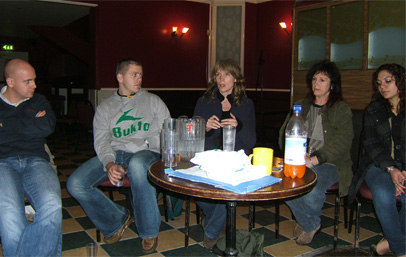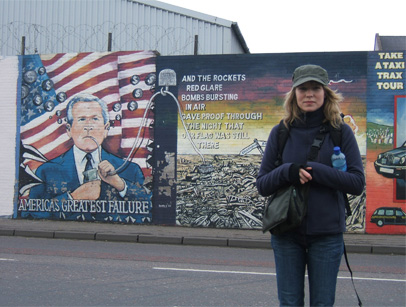No Volverán in Ireland
- 10 December 2007
Dublin
Hands Off Venezuela Ireland organized screenings of the film 'No Volverán: The Venezuelan Revolution Now' in Dublin (November 26th) and in Belfast (November 27th) and invited me, as one of the filmmakers, along to participate in the after-film discussion. The first show was at the New Theatre in Connolly Books in Temple Bar, Dublin, a lovely little theatre at which twenty were present. As you made your way to the theatre in the back of the shop, you walked past a wide range of left-wing books, past posters of Karl Marx, Irish trade unionist James Larkin and of course, the bookshop's namesake James Connolly, the great Irish Marxist and revolutionary who helped lead the 1916 Easter Rising.
Dáithí from Hands Off Venezuela Ireland and èirígí, introduced the film and chaired the discussion afterward. He said how important he thought events in Venezuela were and that he considered the film an important continuation of information from previous films like 'The Revolution Will Not Be Televised' and 'Venezuela Bolivariana'.
The discussion mostly revolved around the latest developments in Venezuela and the status of the factory Sanitarios Maracay. The up-coming constitutional reform was a big topic as well.
One audience member commented that perhaps the film was overly positive and lacked representation of those critical of the Venezuelan process. I answered that in the current atmosphere of mostly negative and distorted media coverage of the Venezuelan revolution, it was an important and truthful position to defend as it was based on the true balance of forces on the ground. When we were there filming, the majority of people we met were overwhelmingly in favour of the revolution and the film features their point of view, said in their own words. After so many defeats for the opposition, like the defeat of the 2002 coup, the oil lockout, the recall referendum and the presidential elections we found that those against the revolution were relatively small in number, unorganized and based their hysterical opposition on outright lies easily proven to be false if one took a moment to look. Another audience member agreed with me and added that the bias is reflected in the choice of the majority of Venezuelans in over 12 electoral processes and so it should be dominant. The negative should not be ignored but its proportion should be considered. To over emphasize it, as so many in the mainstream media do, would actually be a terrible misrepresentation of the facts.
Belfast
 The next screening was in
Belfast at The
Felon's Club. Prior to the screening, Ciarán and Pádreig, members of the James
Connolly Debating Society, gave me a tour of the once battle-torn Belfast, the scene of
much sectarian conflict between its loyalist and republican populations. The
in-depth knowledge of my guides made it a journey through time, where bombings,
assassinations and street violence formed a backdrop to life throughout the
period known as 'The Troubles'. We went to the graveyard where the graves of
the dead of the republican movement were laiden with green, white and orange
flowers and flags. The Irish
Republican History
Museum, the commemorative
monuments and the many murals depicted the events of the Easter Rising, the
fight for workers' rights and the martyrs and political prisoners fighting for
national liberation. These were all linked up to the international struggle for
liberation with a string of massive murals on the 'International wall'.
The next screening was in
Belfast at The
Felon's Club. Prior to the screening, Ciarán and Pádreig, members of the James
Connolly Debating Society, gave me a tour of the once battle-torn Belfast, the scene of
much sectarian conflict between its loyalist and republican populations. The
in-depth knowledge of my guides made it a journey through time, where bombings,
assassinations and street violence formed a backdrop to life throughout the
period known as 'The Troubles'. We went to the graveyard where the graves of
the dead of the republican movement were laiden with green, white and orange
flowers and flags. The Irish
Republican History
Museum, the commemorative
monuments and the many murals depicted the events of the Easter Rising, the
fight for workers' rights and the martyrs and political prisoners fighting for
national liberation. These were all linked up to the international struggle for
liberation with a string of massive murals on the 'International wall'.
 Here, again, the
discussion after the screening revealed a keen interest and enthusiasm for
events taking place in Venezuela.
Many topics were covered like the role of the Venezuelan military and whether
it can play a progressive role unless it is controlled by the population. And
finally, the lessons to be learned for us here in Europe
were discussed.
Here, again, the
discussion after the screening revealed a keen interest and enthusiasm for
events taking place in Venezuela.
Many topics were covered like the role of the Venezuelan military and whether
it can play a progressive role unless it is controlled by the population. And
finally, the lessons to be learned for us here in Europe
were discussed.
Several people congratulated the film-makers for the film and said they were inspired to see the struggle for workers' control and the building of communal councils in Venezuela's bid for the transfer of wealth and power from the rich, elite minority to the vast majority of poor Venezuelans.

 Please help build the campaign by
Please help build the campaign by